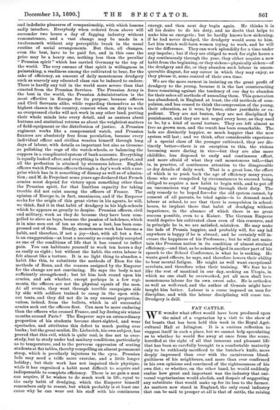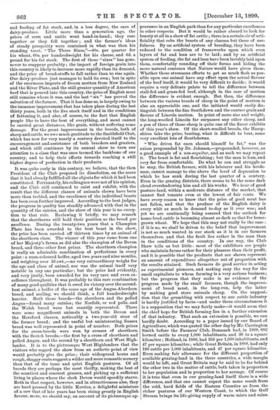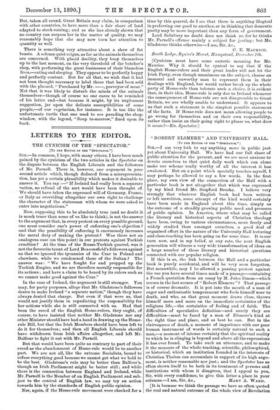FAT CATTLE.
WE wonder what effect would have been produced upon the mind of a vegetarian by a visit to the show of fat beasts that has been held this week in the Royal Agri- cultural Hall at Islington. It is a curious reflection to suggest itself in such a place, but we cannot help speculating as to whether he would flee away at once from the scene, horrified at the sight of all that innocent and pleasant life that has been so carefully brought to a comfortable maturity only to be ruthlessly sacrificed to the butcher's knife, more deeply impressed than ever with the carnivorous blood- guiltiness of his neighbours, and more than ever confirmed in his own opinions and convinced of the righteousness of his own diet ; or whether, on the other hand, he would suddenly realise how great and important was the industry that uni- versal vegetarianism would abolish, and despair of suggesting any substitute that would make up for its loss to the farmer. As matters now stand in England, the only rural industry that can be said to prosper at all is that of cattle, the raising
and feeding of fat stook, and, in a less degree, the care of dairy-produce. Little more than a generation ago, the prices of corn and cattle went hand-in-hand ; they rose together or they fell together ; and the farmer's ideas of steady prosperity were contained in what was then his standing toast, " The Three Sixes,"-60s. per quarter for his wheat, 60s. per hundredweight for his cheese, and 6d. a pound for his fat stock. The first of these " sixes " has gone, never to reappear probably; the import of foreign grain into this country is likely to increase more rapidly than its demand, and the price of bread-stuffs to fall rather than to rise again. Our dairy-produce just manages to hold its own; but in spite of the enormous imports of frozen mutton from New Zealand and the River Plate, and the still greater quantity of American beef that is poured into this country, the price of English meat still remains where it was, and the last " six " has proved the salvation of the farmer. That it has done so, is largely owing to the immense improvement that has taken place during the last thirty years, both in the live stock itself and in the conditions of fattening it, and also, of course, to the fact that English people like to have the best of everything, and meat cannot be carried great distances, like grain, without suffering some damage. For the great improvement in the breeds, both of sheep and cattle, we owe much gratitude to the Smithfield Club, which has now for very nearly a century devoted itself to the encouragement and assistance of both breeders and graziers, and which still continues by its annual show to turn our attention to a class that was once termed the backbone of our country, and to help their efforts towards reaching a still higher degree of perfection in their products.
It was quite early in this century, we believe, that the then President of the Club proposed its dissolution, on the score that it had already fulfilled all the objects for which it had been constituted. Fortunately, his colleagues were not of his opinion, and the Club still continued to exist and exhibit, with the result that the different classes of animals shown have been more than trebled, and the excellence of the individual beasts has been even further improved. According to the best judges, the progress in quality has steadily advanced with that in the quantity of the entries, and the show of this year is no excep- tion to that role. Reviewing it briefly, we may remark that the shorthorns still hold their position as the breed par excellence. During the twenty-two years that a Champion Plate has been awarded to the best beast in the show, the prize has been carried off thirteen times by an animal of the shorthorn class. The winner of this year came from one of her Majesty's farms, as did also the champion of the Devon breed, and three other first prizes. The shorthorn champion is really an admirable combination of perfections in every point : a roan-coloured heifer, aged two years and nine months, and weighing over 16 cwt.,—no very extraordinary weight for the age and class of animal, nor was the animal itself very notable in any one particular; but the prize had evidently, and very justly, been awarded for its very rare and even ex- cellence throughout. It was probably to this rare combination of many good qualities that it owed its victory over the second- best animal, a heifer of the same age of the Angus-Aberdeen breed, and scaling, we should think, a full hundredweight heavier. Both these breeds—the shorthorn and the polled Angus—found many entries; the Norfolk, or red polls, and the Welsh breed were but scantily represented. There were some magnificent animals in both the Devon and the Hereford classes, noticeably a two-year-old steer of the former breed; and the useful but uninteresting Sussex breed was well represented in point of number. Both prizes for the cross-breeds were won by crosses of shorthorn with the Scotch breeds,—the first by a cross of shorthorn and polled Angus, and the second by a shorthorn and West High- lander. It is to the picturesque West Highlanders that the visitors who regard the show from an aesthetic point of view would probably give the prize ; their widespread horns and rough, shaggy coats suggest a wilder and more romantic scenery than that of the tame and quiet English pastures. Of all breeds they are perhaps the most thrifty, making the best of the scantiest and coarsest grasses, and picking up a sufficient living in places where the sleek Devon would speedily starve. Both in that respect, however, and in attractiveness also, they are bard pressed by the little Berries, a delightful miniature of a cow that of late years has been rising greatly in English favour, more, we should say, on account of its picturesque ap-
pearance in an English park than for any particular excellences in other respects. But it would be rather absurd to look for beauty at all in a show of fat cattle ; there is a certain air of arti- ficiality that robs the beasts of any charms but those of use- fulness. By an artificial system of breeding, they have been reduced to the condition of frameworks upon which even layers of fat and lean are to be laid; and by an artificial system of feeding, the fat and lean have been lavishly laid upon them, comfortably rounding off their forms and hiding the more natural contours that Nature would have given them. Whether these strenuous efforts to get as much flesh as pos- sible upon one animal have any effect upon the actual flavour of the beef itself, it would be very difficult to decide; it would require a very delicate palate to tell the difference between stall-fed and grass-fed beef, although in the case of mutton the difference is evident enough. But then, the difference between the various breeds of sheep in the point of mutton is also an appreciable one, and the initiated would easily dis- tinguish between the fine Southdown and the coarser grain and flavour of Lincoln mutton. In point of mere size and weight, the long-woolled Lincoln far surpasses any other sheep, and a pen of three of those sheep is quite one of the finest exhibits of this year's show. Of the short-woolled breeds, the Ramp- shires take the prize, beating, what is difficult to beat, some very excellent lots of Southdown.
" Who drives fat oxen should himself be fat," was the propounded by Dr. Johnson,—propounded, however, as a good example of a non-sequitur, and as such we may repeat it. The beast is fat and flourishing; but the man is lean, and very far from comfortable. Do what he can and struggle as- he may, the British farmer, with his labourer and his herds- man, cannot manage to rise above the level of depression to which he has sunk during the last quarter of a century_ Even in the grazing districts, there seems to be the same dark cloud overshadowing him and all his works. We hear of good pasture-land, within a moderate distance of the market, that cannot find tenants even at the lowest of fair rents. We have every reason to know that the price of good meat has not fallen, and that the produce of the English dairy is every whit as much in demand to-day as it ever was ; and yet we are continually being assured that the outlook for home-bred cattle is becoming almost as dark as that for home- grown wheat. We hope that this may not really be the case if it is so, we shall be driven to the belief that improvement is not so much wanted in our stock as it is in our farmers themselves, and that the fault lies rather in the man than in the conditions of the country. In one way, the Club- Show tells us but little : most of the exhibitors are people who maintain farms rather for their pleasure than their profit, and it is possible that the products that are shown represent an amount of expenditure altogether out of proportion with the results attained. Such farmers do good service in acting as experimental pioneers, and making easy the way for the small capitalists to whom farming is a very serious business;. but the progress that they make is no evidence of the progress made by the small farmers, though the improve- ment of breed must, in the long-run, help the latter by making good store animals cheap. On the supposi- tion that the grumbling with respect to our cattle industry is hardly justified by facts—and under these circumstances it is a supposition that we may fairly make—it would seem that the chief hope for British farming lies in a further extension of that industry. That such an extension is possible, we can hardly doubt. According to a paper issued by our Board of Agriculture, which was quoted the other day by Mr. Carrington Smith before the Farmers' Club, Denmark had, in 1888, 68'2 horned cattle to every 1,000 inhabitants, and 38 to a square kilometre ; Holland, in 1886, had 356 per 1,000 inhabitants, and 47 per square kilometre ; while Great Britain, in 1888, had only 188 cattle per 1,000 inhabitants, and 47 per square kilometre. Even making fair allowance for the different proportion of available grazing-land in the three countries, a wide margin would be left, and Great Britain may be said to be far behind the other two in the matter of cattle, both taken in proportion to her population and in proportion to her acreage. Of course it is true that even in our grazing-land itself there is a wide difference, and that one cannot expect the same result from the cold, hard fields of the Eastern Counties as from the richer pastures of our Western Coast, to which the Gulf Stream brings its life-giving supply of warm mists and rains.
But, taken all round, Great Britain may claim, in comparison with other countries, to have more than a fair share of land adapted to stock-raising; and as she has already shown that no country can surpass her in the matter of quality, we may reasonably hope that she may now turn her attention to quantity as well.
There is something very attractive about a show of fat beasts. A solemn quiet reigns, as far as the animals themselves are concerned. With placid docility, they busy themselves up to the last moment, on the very threshold of the butcher's shop, with performing the great businesses of their blameless lives,—eating and sleeping. They appear to be perfectly happy and perfectly content. But for all that, we wish that it had not been thought necessary to label those that had been sold with the placard, " Purchased by Mr. —, purveyor of meat." Not that it was likely to disturb the minds of the animals themselves—though of course no one cares to be reminded of his latter end—but because it might, by its unpleasant suggestion, jar upon the delicate susceptibilities of some people,—of our vegetarian, for instance. It is too like the unfortunate turtle that one used to see parading the shop- window, with the legend, "Soup to-morrow," fixed upon its back.












































 Previous page
Previous page